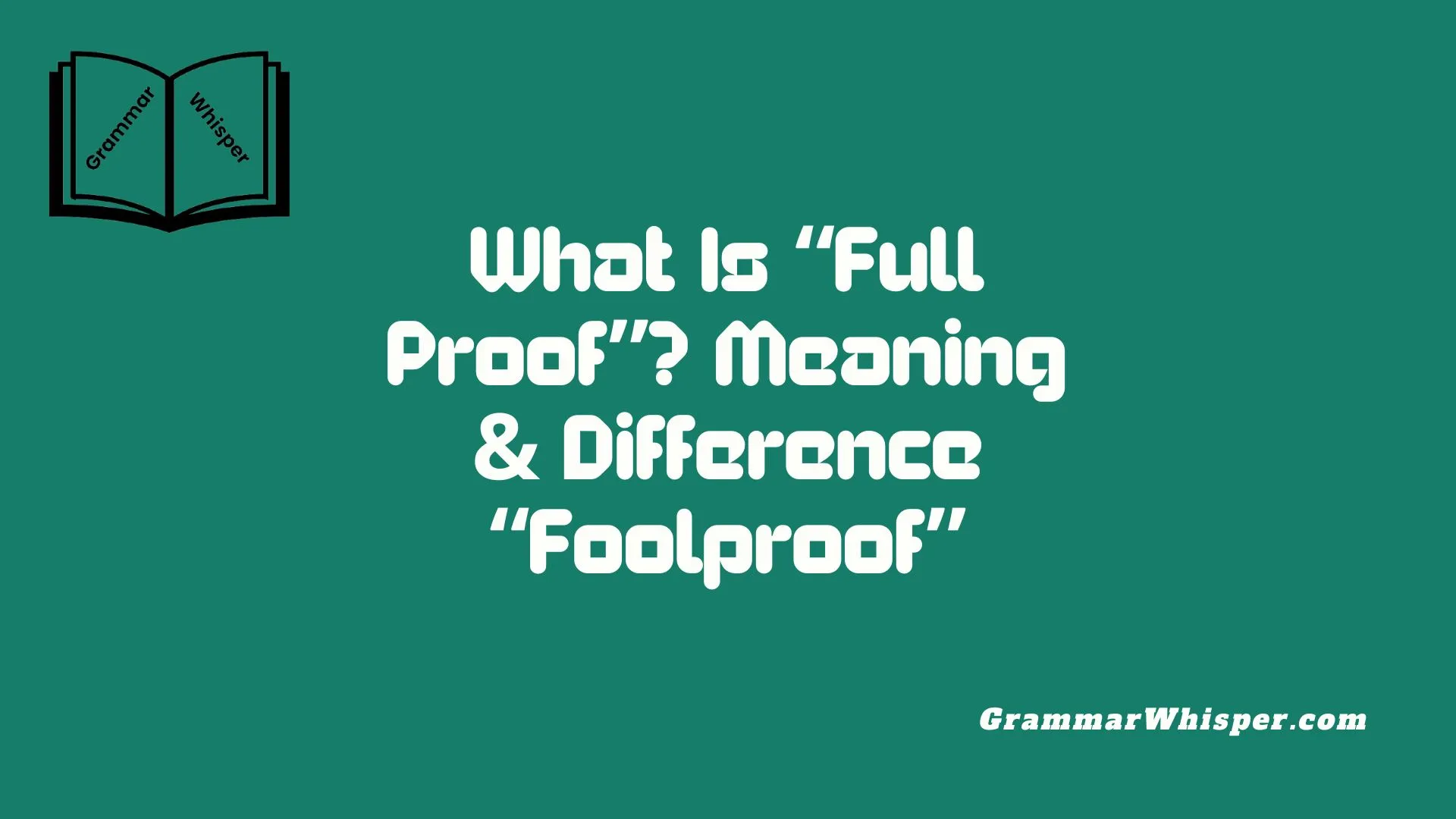In modern English, it’s easy to make a mistake when a phrase simply sounds right but actually isn’t. That’s exactly the issue with Full Proof and foolproof – two expressions that are nearly identical in sound, but not in meaning or usage. Many people have mistakenly said or written “full proof” assuming it’s the correct word for something completely reliable. But it’s a textbook misuse, a misused term that doesn’t hold up in a real-world context. I once reviewed a student essay where they used “a full proof strategy.” The sentence was awkward and needed immediate editing. It wasn’t just grammatically off – it was incorrect, and the student wasn’t even aware. They’d merely heard the phrase, found it familiar, and repeated the error without a second thought.
This article explains the difference and compares the two phrases for clarity. It also clears the confusion by tracing their linguistic history – how these expressions evolved in the language. While “full proof” exists in older texts, especially in legal or historical references, its meaning has faded in modern times. Meanwhile, “foolproof” describes a system or plan that’s secure, immune to errors, and doesn’t require careful attention. Truly understanding which term fits best isn’t just a matter of grammar – it’s about clarity, precision, and sending a message that radiates confidence.
Is “Full Proof” Even a Real Phrase?
Yes – and no. “Full proof” is technically a real phrase, but it’s rarely used in today’s English unless in historical, legal, or technical contexts. In modern everyday language, it’s nearly always a misspelling or misunderstanding of “foolproof.”
“Full proof” is not the phrase you’re looking for – unless you’re reading a 17th-century military manual.
Etymology and Historical Use of “Full Proof”
To understand the term, let’s dive into its linguistic roots.
- The adjective “proof” originally meant “resistant to” – think “bulletproof” or “waterproof.”
- When something was described as “full proof,” it meant it was entirely resistant – e.g., armor that was fully tested and deemed impervious to weaponry.
Examples from historical texts:
- “The plate is full proof against musket balls.”
- “The fortress was made full proof by the engineers of the Crown.”
This usage has mostly faded out of general English, but it still appears in:
- Legal documents
- Historical novels
- Military terminology
Why People Confuse “Full Proof” and “Foolproof”
There are three major reasons people mix them up:
1. Phonetic Confusion
“Full proof” and “foolproof” are homophones – they sound almost identical, especially in spoken conversation.
2. Autocorrect and Typing Errors
Word processors may not catch “full proof” as an error because both words are spelled correctly – just incorrectly combined.
3. Semantic Assumptions
People assume “full proof” means something is 100% reliable – which “foolproof” does mean – but “full proof” doesn’t, at least not anymore.
“If it looks right and sounds right, it must be right.” – This is the trap most English learners fall into.
The Real Word You’re Looking For: “Foolproof”
“Foolproof” means so well-designed, simple, or secure that even a fool couldn’t mess it up. It’s a modern idiom that’s widely accepted in formal and informal communication.
Definition (Oxford Dictionary):
Foolproof (adj.): incapable of going wrong or being misused.
Synonyms:
- Error-proof
- Fail-safe
- Reliable
- Self-explanatory
“Full Proof” vs. “Foolproof”: Side-by-Side Comparison
Here’s a quick table to clear up the confusion:
| Feature | Full Proof | Foolproof |
| Is it a real English phrase? | Yes (archaic/technical) | Yes (modern and common) |
| Meaning | Fully resistant (old usage) | 100% reliable or simple |
| Common usage today? | Rare | Very common |
| Proper usage scenario | Historical texts, armor, legal docs | Instructions, tools, ideas |
| Often misused? | Yes, as a mistaken version of foolproof | Rarely |
Examples of “Full Proof” Used in Correct Context
Here are a few cases where “full proof” is valid:
- “The steel plating was full proof against arrows and spears.”
- “Only full proof armor was accepted for royal guards in the 1600s.”
- “The fortress, with its 30-foot walls, was considered full proof against invasion.”
These examples mostly belong to historical or technical writing, not daily English.
Examples of Incorrect Modern Usage of “Full Proof”
Let’s look at sentences where people wrongly use “full proof” instead of “foolproof”:
- ❌ “This software is full proof against viruses.”
- ❌ “We need a full proof plan before we pitch it.”
- ❌ “Her recipe is full proof – you can’t mess it up!”
Each of these should use “foolproof” instead:
- ✅ “This software is foolproof against viruses.”
- ✅ “We need a foolproof plan before we pitch it.”
- ✅ “Her recipe is foolproof – you can’t mess it up!”
Examples of “Foolproof” in Correct Everyday Usage
Here’s how “foolproof” is correctly used in daily English:
- “The instructions were foolproof – I put the shelf together in 10 minutes.”
- “He built a foolproof security system for the front door.”
- “We created a foolproof checklist to avoid last-minute chaos.”
Real-world usage from popular media:
- Tech blogs: “We tested 10 VPNs to find the most foolproof options for privacy.”
- Recipe websites: “This is a foolproof banana bread even beginners can master.”
Quick Grammar Tip: How to Avoid Mixing Them Up
Use this easy memory trick:
“Even a fool can do it = Foolproof.”
“Foolproof” is about being idiot-resistant. “Full proof” might sound like it fits, but in modern English, it’s simply wrong 95% of the time.
Other Commonly Confused Word Pairs
“Full proof” vs. “foolproof” is just one of many common English mix-ups. Here are more to watch out for:
| Incorrect Phrase | Correct Phrase | Why People Get It Wrong |
| Wet your appetite | Whet your appetite | “Wet” seems logical, but “whet” means to sharpen |
| Peak interest | Pique interest | “Peak” = mountain top; “pique” = to provoke |
| Reign in your emotions | Rein in your emotions | “Reign” = royal rule; “Rein” = control a horse |
| Shoe-in for the job | Shoo-in for the job | “Shoe” is a common object, but “shoo” = easy win |
Should You Ever Use “Full Proof” in Writing?
Unless you’re:
- Writing a historical fiction novel
- Drafting military specifications
- Referring to armor or fortress design
…you should avoid using “full proof.”
Use “foolproof” instead for anything modern, idiomatic, or conversational.
Summary Table: What You’ve Learned
| Misused Term | Intended Meaning | Correct Word | Usage Context | Notes |
| Full proof | Reliable, secure | Foolproof | Everyday language | “Full proof” is outdated or misused |
| Foolproof | Error-resistant | Foolproof | Universal usage | Preferred in modern English |
Final Thoughts
In professional emails, job interviews, academic essays, and even casual conversations, word choice shapes perception. Writing “full proof” instead of “foolproof” may seem small – but to a reader with a trained eye, it’s a red flag.
Precision earns credibility.
Use “foolproof” when you want to express that something is reliable, easy to follow, and error-proof. Save “full proof” for your next historical reenactment.
Bonus: Mini Quiz – Can You Spot the Error?
Question 1: Which of the following is correct? A) I developed a full proof budgeting system. B) I developed a foolproof budgeting system. ✅ Correct Answer: B
Question 2: True or False: “Full proof” is appropriate when talking about medieval armor. ✅ True
Question 3: What’s the most common mistake leading to “full proof”? A) Autocorrect B) Phonetic confusion C) Misunderstanding meaning ✅ Answer: B and C
Further Reading and References
- Oxford Learner’s Dictionary – Foolproof
- Merriam-Webster – Foolproof
- Purdue OWL – Commonly Confused Words
- Collins Dictionary – Full Proof
Target Keyword(s):
- Full proof
- What is full proof
- Foolproof vs full proof
- Full proof meaning
- Fullproof or foolproof
- Common English errors
FAQs
What does “full proof” mean?
“Full proof” is an old or technical term that historically meant completely resistant or impervious, such as armor that could withstand attacks. It is no longer used in modern English outside of specialized or historical contexts.
Is it correct to say “full proof plan”?
No, it isn’t. The correct phrase is “foolproof plan.” That means a plan that is guaranteed to succeed or is simple enough that it won’t fail – even if a fool were to follow it.
Why do people confuse “full proof” and “foolproof”?
Because they’re homophones – they sound nearly identical when spoken. Many people also assume “full proof” means “completely reliable,” which is what foolproof actually means in modern usage.
Is “foolproof” considered informal?
No. “Foolproof” is fully acceptable in both formal and informal writing. You’ll find it in academic writing, technical manuals, business documents, and everyday conversation.
Can “full proof” ever be used correctly?
Yes, but only in narrow historical or technical contexts. For example, describing medieval armor or legal language in ancient documents. In everyday modern English, it’s almost always incorrect.











